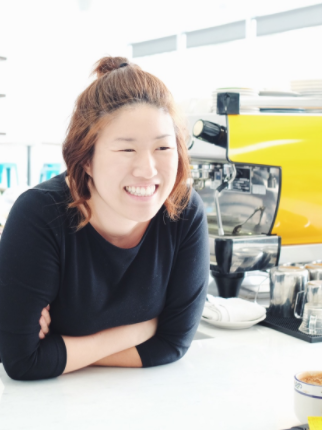We are launching a new series at our practice called “The Humans of MHT.” The idea being...healing happens in the context of real relationships, real people. Not perfect, unknown others, but people engaged in life and meaning-making just like you.
We'll be releasing one interview a month, so you can get a glimpse of the humans that sit in the chair across from you. Check out our first interview with Allie Ramsey, our Clinical Care Coordinator and Marriage & Family Therapist Intern. She's got some great thoughts on what it means to be human.
- Michelle Harwell, LMFT
Meet Allie Ramsey, Marriage and Family Therapist Intern and Clinical Care Coordinator at MHT.
M: Well, hello Allie!
A: Hi!
M: You are our first human therapist of Michelle Harwell Therapy! So how does your humanness show up in the therapy session?
A: One of the biggest ways I notice my humanness showing up is the fact that I feel very impacted by my clients stories. They really influence me and help me to think about life more complexly. Life is so packed with meaning and intensity. Getting to step into that with my clients as a fellow human means I get to live very richly with them. It is very fulfilling.
M: You are saying something about a contemporary view about how we think about change in therapy. Old models would see the therapist as an observer or objective voice that is separate from the client. But you are talking about about a very different view. That there is something two person going on in that, your clients, even though you are there and focusing on their story, you are also a part of it. And you are impacted by them. Alot of times clients don't know that they impact us. That we carry them. That we are inspired by them. That we are touched and moved by them and changed. That our clinical work can enhance our own lives. And I think because of that, we can make change. It is the very fact that we care and can be impacted means it is a real connection.
M: The other thing I was thinking about was some of the aspects of your humanness that is impactful to me. That draws me to you...One aspect that comes to mind when I think of you is kindness. That is an attribute of your humanness that is impactful to me. There is an author named Adam Phillips and he defines kindness as the ability to ones own vulnerability in ourselves and that of an another. To be connect and to stay soft, open and tender. I think about that, when I think about you.
A: So for those who will be watching and don't know. Being from Washingtion and moving to LA, something I have bumped up a lot against is a pressure to be more sophisticated then I am or a little more in the know then I tend to be. I've come to value a lot of this as there is so much artistic vitality in LA culture. But sophistication is something I keep running up against because I don't feel like I am a very sophisticated person. Its just not part of my soul. ButI feel some freedom in trusting in being kind as enough.
M: I think you are talking about how you come across in groups. I experience this with you. When you don't know something or when you are not sure about something, you are apt to say it and be in your authenticity with a kind of grace, curiosity and silliness that invites people to be along for the ride. I think you have a real inviting presence.
M: Is there anything people would be surprised to know about you?
A: Most things probably...One thing people would be surprised to know is that for most of my life ant through college I was a collegiate level sprinter. Although I don't think I look or present that way anymore. I don't look nearly as fierce as I used to. But there is a part of me that pretty competitive and enjoys the intense part of life. I have a need for speed.
M: Laughs.
A: You wouldn't catch me going fast in my Prius though.
M: Its funny. I knew you were an athlete but what is new to me, but it makes more sense, that there is an internal competitor.
A: Oh, yes. There certainly is.
M: Laughs
A: I'm not sure how it shows up these days. It shows up in little ways. I'm looking for more outlets. I'm joining a kickboxing community because, you know, you got to get a little competitive somewhere.
M: I think we need an MHT games night. A team game night so we can really see the personality come out on our team. We need to do our developmental assessment with all the therapists.
A: My frustration might be kind of low. There is this one game my husband really likes. He goes deep. There is this game we play together that cold war, very long, narrative based game. And we had been playing for about an hour and it was demanding all of my mental capacities and I lost. I said, "I can't talk to you. I have to take a shower." That's the level I can get to.
M: I love it. It's a little Brombergian self-state. A little island that gets activated around competitiveness. I need to know this side of you more. It makes me happy to know that there is this intense person in there.
M: So finally, what does humanness mean to you?
A: One of the first things that comes to mind when I think of humanness is worth or value. I think being human mean having an immense amount of worth and value. Being worthy of a lot of honor. That is one of my central organizing thoughts as a therapist, that my main job is to honor the person I am with. Somehow for me that captures what it means to really care and give my very best to each client that I sit with. To try and step into their shoes and try and understand what it means to be them, what they experience. Humanness means be worthy of that. Being worthy of being understood.
M: Beautifully said.
Allison (Allie) Ramsey is a Marriage and Family Therapist Intern, IMF #94391, working under the professional supervision of Michelle Harwell, PsyD, MFT 50732. Allie works with individuals on a broad range of issues, including anxiety, depression, relational challenges, faith integration, divorce, and aging.
Dr. Michelle Harwell, PsyD, LMFT is an expert trainer, respected speaker, and licensed therapist in trauma and attachment. She is noted for her specialization in areas of development, attachment, trauma, and neuroscience, and her ability to communicate complex topics with clarity and humor. Michelle completed her PhD in Psychoanalysis from The Institute of Contemporary Psychoanalysis. She received her BA in English Literature from University of Oklahoma, MA in Theology from Fuller Theological Seminary, and MS in Marriage and Family Therapy from the Fuller Graduate School of Psychology.


















